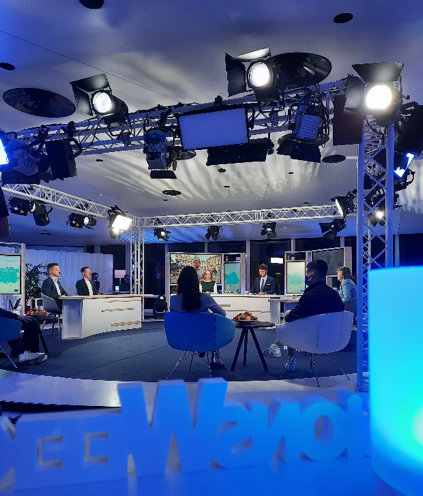
Youth from all around Europe gathered in Brussels, Belgium and discussed cohesion and important reforms with European Commissioner Elisa Ferreira. More than 50 participants and eight videos from different regions made by "Youth4Regions" alumni had one purpose: united citizens dialogue.
"My goal is to support the young generation," Madame Commissioner Ferreira said. The words are important not only to the Citizens Dialogue, but to the entire next generation of Europe.
By Guste Valantinaviciute and Kristiana Anna Jurgensone (Edited by Vilde Skorpen Wikan)
Dialogue between generations
The project videos made by "Youth4Regions" alumni highlighted four different topics that are important to all European citizens: (1) cohesion, (2) green transition, (3) digital transition, and (4) citizens' engagement. They were presented at the Citizens Dialogue with Elisa Ferreira, the European Commissioner for Cohesion and Reforms, as part of the 19th European Week of the Regions and the Cities. And despite covering different topics, all the projects were united in shared values on establishing a better and safer future for the next generation. They received encouraging words from Commissioner Ferreira, who emphasised that the EU has faith in young people’s abilities to take the necessary actions to achieve tangible results.
"I believe we gained a lot of important responses from the public," said one of the Citizens Dialogue hosts, Dino Subasic. "The EU is trying to connect to the regions, people living in border regions who are sometimes unnoticeable to national leaders. So I am glad we had an opportunity to connect through the Citizens Dialogue."
Commissioner Ferreira agreed. She also added that the format was useful to discuss a range of different content.
"A lot of good energy, competence and ideas were actively shared today with so many young journalists," Ferreira said.
"This is simply wonderful," she added.
Communication is the key
Commissioner Ferreira was also honest about how the pandemic years have presented new challenges to the European Union. Yet she emphasised how the EU also had several successful responses.
"The commission took initiatives, created cohesion funds to buy masks, vaccines, computers for schools," Ferreira said. "We did all sorts of support which never happened before."
The responses have not gone unnoticed. Last year's "Youth4Regions" participant from Lithuania, Lukas Paskevicius, spoke warmly of the EU Commission after showing his video from Albine region in France.
"What European institutions are giving for young people can be summed up in one word: Wow," Paskevicius said.
Room for improvement
Trust in young people was an element highlighted by all the projects included in the videos. And the participants were given assurance by Commissioner Ferreira that the efforts of young people to make Europe better for all of us will not go unnoticed. The videos emphasised that in a time characterised by the challenges posed by social injustice, climate change and the pandemic, young people are trusted and that their opinions, knowledge and interests are valid.
But the situation in Europe is far from perfect. Lukas Paskevicius’ video illustrated how different countries, regions and even people themselves are used to compete with each other, something that can make regional development more challenging.
Paskevicius also said that he would like to see youth from all European regions more involved in the decision-making.
"Everything starts with an idea," Paskevicius said. "So don’t be afraid to share your vision and something will come out of it. I can promise you that it will be a very enjoyable experience."
He received support from Commissioner Ferreira:
"Young people are our future. People in my age already did a lot and now it is time for young people to show their visions," she said.
Meanwhile Alexandr Stanciu from Romania introduced a very different theme to the Citizens Dialogue. His focus had been the participatory budget approach in Romania’s regions. He pointed out that advantages from that kind of budget are noticeable in municipalities, but that the effects can be felt more strongly on a local rather than national level.
Greener Europe is a must
The very term "cohesion", however, may be one that not everyone will be familiar with. But it is a key part of our everyday lives. And on some occasions, such as during the pandemic, it has even saved the lives of people in Europe.
This was the achievement of a project from Spain. The multipurpose mobile unit "UMPEO" managed to reduce social inequality by overcoming geographic obstacles when distributing vaccines. The mobile unit was thus able to adapt to the extreme situation and bring the lifesaving vaccines to people whose lives were at risk.
Apart from the pandemic, however, climate change also poses a massive challenge. Fortunately, the fight against CO2-emissions, pollution, and other aspects of climate change is one of the EU Commission's top priorities. Green transition is also high on the agenda of other international organizations, such as OECD, while also becoming more important for the private sector.
Projects covered in the videos from the young journalists also recognized and gave a "face" to the people committed to driving change. For example, the EU Commission has supported the development of energy efficient schools in Croatia, Montenegro and Bosnia and Herzegovina.
It is important that knowledge about climate change becomes more than just a video seen on the internet. The young generation needs to be taught in a practical way about how they themselves can contribute to tackling the different sides of this complex problem. This project has done that and more: from school competitions in energy saving and energy management training to a camp for the young renewable energy innovators, it is safe to say that the next generation will be educated and informed on topics which are important to all of us.



